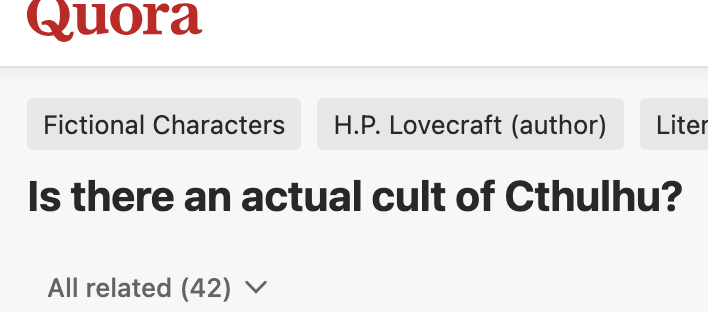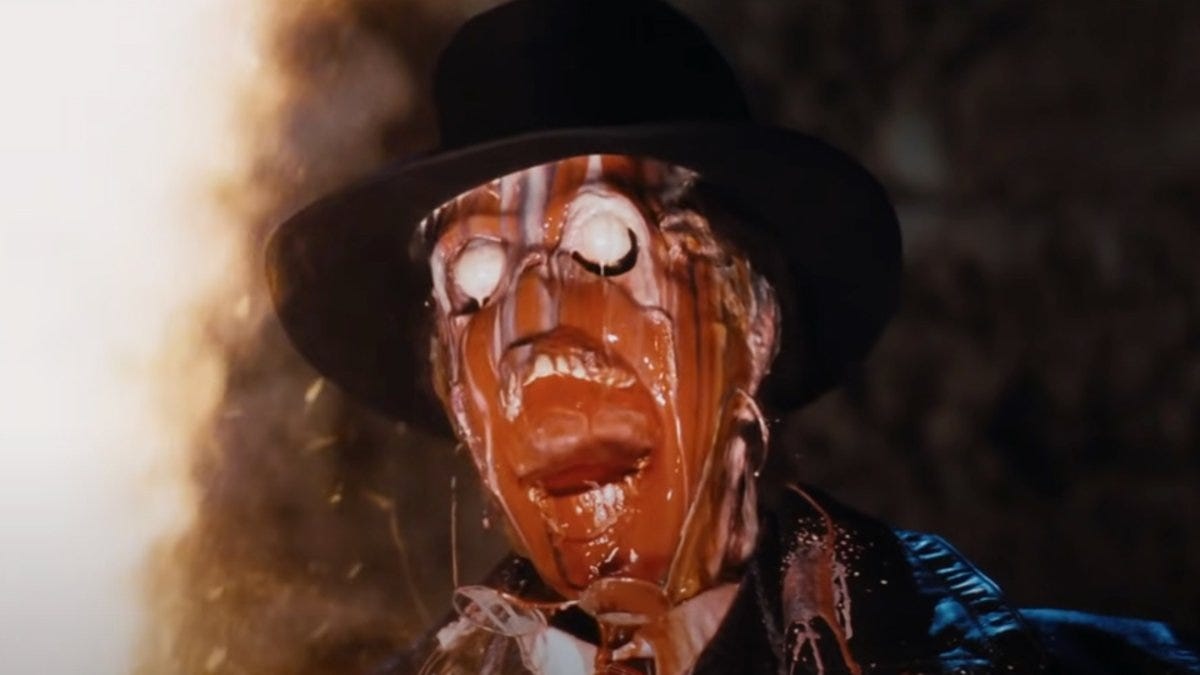Everything is Weird Fiction
Infinite Longing in an Unknowable Universe
The only truth is poetic truth. Everything else, from science and religion to philosophy and history, should be treated as a sort of Weird Fiction. I do not mean this to be disparaging. Indeed, few are the human pursuits more worthy than that tetrad, but none should be mistaken for a tool capable of revealing Absolute Truth. That is, and will forever remain, an unknowable mystery, closed to our human brains, something to which we can offer only our awe.
Do not bemoan, for this is a liberating revelation!
For a long time, I kept books on my shelf that I told myself I was working my way up to. These were difficult books, especially works of philosophy and psychology. I used to do the same with literature, but then one day I just started reading them. You can do that, you know. Still, reading notoriously difficult novels, such as Gravity’s Rainbow or Ulysses, felt a far cry from broaching something like Anti-Oedipus. I have been reading fiction all my life, but I have very little background in philosophy or psychology. I should do it right and start with the Greeks and work my way forward, eventually get a firm understanding of Freud, I would tell myself, but that was just a way of avoiding the challenge altogether. I will never be sufficiently ready on an academic level as I’m not an academic. I’m a barista. But maybe I could approach them as a kind of literature. After all, if no Absolute Truth can be spoken about Reality, then every utterance is a kind of thought experiment, including the rational languages of philosophy and science, and the most sober-minded social realism, just a type of Weird Fiction which asks:
What if this was how things really were?
Malleable Reality
The contemporary anarchist philosopher, Federico Campagna, has made a career out of revealing the malleability of so-called reality. In his recent book, Otherworlds, Campagna writes:
“Since the infinite chaos of reality will always exceed the limits of any conceptual system, we should recognize that all our attempts at reducing it to a meaningful cosmos are merely ‘likely stories’” (10).
These stories make life livable. While they do require a certain amount of buy-in in order to activate their powers, they should not be mistaken for Reality itself. What we call reality is really only a game we play. It is a projection, a network of symbols and stories. While it may well be vast beyond any individual imagining, it is nonetheless only a tiny etching of Reality itself. Call it a lifeworld, a reality tunnel, or nomos, it is a system of meaning which allows for the possibility of something like dwelling comfortably in an ultimately unknowable universe.
Such systems largely emanate from the sensory apparati available to their given inhabitants. A praying mantis experiences reality quite differently from an oak tree, or a stone, for instance. The inputs they receive are not even compatible with one another’s “hardware”, so to speak.
With humanity, there is a bit more hybridization. Our lifeworlds, like those previously listed, take into account our shared anatomies, as well as the material conditions of time and place, but then there is the added influence of that horribly amorphous entity known as culture. Culture is the accumulation of all the ways we describe the world to ourselves through our own Weird Fictions. These fictions are most prized not for their Absolute Truth, but for their use-value. In that way, religious, philosophical, and scientific answers may all satisfy the same need in their own way, and to that end they will become inscribed into the Weird Fiction of their respective culture.
As with the names Europeans attributed to the various Peoples living in the Americas largely translating to “The People” in their own languages, lifeworlds don’t tend to have proper names. It is hard to see outside of them. They are often taken for reality itself by their inhabitants. That is the meaning of the famous quote “It’s easier to imagine the end of the world than the end of capitalism.” In that sense, capitalism is operating as our lifeworld, and a lifeworld is viewed, by the uninitiated, as inmutable reality, so it might as well read as: It is easier to imagine the end of the world than the end of reality. However, as the work of Campagna shows, countless reality-systems have existed before ours. Hell, many exist alongside ours now despite its insistence on hegemony. They will all one day fall and new ones will rise. All the while, Reality itself will scarcely be touched.
Okay, but What is Weird Fiction?
Turns out, that’s a difficult question to answer.
Decades before the coining of the term, there were writers, such as Edgar Allan Poe, producing work that would be retroactively and uncontroversially ushered into the Weird Canon, but it was not until H.P. Lovecraft came around and penned his essay Notes on Writing Weird Fiction that the chimera took on a name. From there, a pole was raised and a rather large tent came to shelter many artists. In the early days, most of these writers could be found in the table of contents of literary journals such as Weird Tales and the like, including mainstays Robert E. Howard, Clark Ashton Smith, Arthur Machen, Algernon Blackwood and, of course, Lovecraft himself.
Lovecraft’s great achievement was not the outlandishness of his Weird Tales, but the sense of reality which imbues them. The glimpses we get of the Necronomicon, the grimoire referenced across Lovecraft’s work, give the sense of something much larger that he is pulling from, some lost religion, or holy text out of whose material he has created the Cthulhu mythos. That is, it feels as if it is outside and beyond his stories rather than embedded within.
Robert Chambers pulls off a similar maneuver with The King in Yellow, a fictional play that appears across four short stories in his collection of the same name. One reads such works and easily forgets it is a fiction within a fiction. The outside and inside become confused. At the very least, one starts to believe it is a real work of nonfiction being referenced within a work of fiction.
It is a signature move of Weird Fiction to blur the lines between reality and irreality, interiority and exteriority, but what else can be said of this slippery genre?
As the twentieth century proceeded, newer inductees would weird the collective further, taxing it beyond the limits of what can even be called genre, for what connective tropes could be traced between the works of Lovecraft’s tentacle-filled nightmares and the far subtler stories of someone like Robert Aickman? What exactly is holding this concept together, and just how flexible is it? Does Philip K. Dick get a ticket in, or is he merely a weird science fiction writer? How about Kafka? Leonora Carrington? Or is it Magical Realism if it comes from south of the Rio Grande, Weird Fiction if it’s from the northside, and only bonafide ~literature with weird characteristics~ if it’s from Europe?
Even New Weird royalty, China Miéville and the VanderMeers, struggle to give a good concise definition in their respective overviews, Weird Fiction and The Weird. Both end up stepping aside and allowing Lovecraft to define it for them, which means they land in a similar place.
Miéville: “[The] obsession with numinosity under the everyday is at the heart of Weird Fiction.”
Ann & Jeff VanderMeer: “It represents the pursuit of some indefinable and perhaps maddeningly unreachable understanding of the world beyond the mundane.”
This sounds an awful lot like what we around here would refer to as Gnosis, that spiritual knowing that is beyond knowing, and, as such, also beyond words. Words and study and devotion might get you most of the way there, but there remains an impassable gap of separation. Here I am reminded of a rather mediocre 2005 romcom featuring Will Smith as a matchmaker and Kevin James as his hapless client. In teaching him how to properly enact a first kiss, Smith tells James to go 90% of the way and stop. Let his partner close the gap.
Gnosis works in a similar way. It cannot be reached through sheer will. Something else must reach out to close the circuit. That is the pursuit of the writer of Weird Fiction. Whether they are after the pure knowledge of the scholar or the scientist, or the aesthetic knowledge of the of the artist, reciprocity is far from guaranteed. I’d wager the majority of Weird Fiction consists of kisses left hanging like unanswered prayers, but there is still a weirdness in the praying. Casting off towards that hard break and reaching for something beyond grasp requires some kind of foreknowledge that attainment is at least possible. Otherwise, who would bother? The question, then, is where does such foreknowledge come from?
Infinite Longing
One of Substack’s resident scholars of Weird Fiction,
, investigates this foreknowledge in a brilliant, short essay titled “Fantasy, Horror, and Infinite Longing”. He begins by describing that October feeling of sweet melancholic upwelling that is perhaps common to us all, and traces it eventually to C.S. Lewis’ first novel, The Pilgrim’s Regress, in which the author appropriates the German word sehnsucht, commonly translated as yearning, which Lewis likens to“an intense longing [for] that unnameable something, desire for which pierces us like a rapier at the smell of a bonfire, the sound of wild ducks flying overhead, the title of The Well at the World’s End, the opening lines of Kubla Khan1, the morning cobwebs in late summer, or the noise of falling waves.”
Such sehnsucht2, Cardin writes, also drives the heart of Weird Fiction, but what is one to do with such a vague and insatiable longing? The type that is evoked by the sunlight falling on a tree, or an unbroken view from a high vista? Going to that place seen on the horizon will satisfy nothing. The desire is not to be there, but to somehow, impossibly merge with it. To close that gap between our pursuit for gnosis and its attainment.
For Lewis, such a merging could be brokered through his Catholic faith, but for someone like Lovecraft, or his modern inheritor, Thomas Ligotti, such a longing is nothing more than a cruel trick of consciousness, and there is nothing behind the summons. As Lovecraft writes in the oft quoted opening to his seminal work, The Call of Cthulhu:
“The most merciful thing in the world, I think, is the inability of the human mind to correlate all its contents. We live on a placid island of ignorance in the midst of black seas of infinity, and it was not meant that we should voyage far. The sciences, each straining in its own direction, have hitherto harmed us little; but some day the piecing together of dissociated knowledge will open up such terrifying vistas of reality, and of our frightful position therein, that we shall either go mad from the revelation or flee from the deadly light into the peace and safety of a new dark age.”
Cthulhu, with all his disparate parts and near infinite adjectives, might be thought to represent this dread vision of science’s eventual revelation which Lovecraft foresaw: the “blind, meaningless, and ultimately unfathomable fluctuations of a purely material cosmos” (Cardin 280).
This, however, is merely another layer of Weird Fiction, another story about how the universe might be, as told by a particularly bleak denomination of scientism, no different in kind from the religious gospels such a vision hopes to displace. Both are true, in their way. Both are reality tunnels that can be entered into, capable of shaping the lived experience of the limits of perceived reality of those who partake, but neither approximates anything like the total picture.
There is another Cthulhu. It is the one that pierces the reality system from beyond rather than from within. Whenever it is thought that the territory has been totally mapped over, it is the great eye of The World that suddenly peers through the paper ceiling. The UFO in the night sky, the blurry bigfoot in the woods, the photons that can be a wave or a particle depending on experimental circumstances. This Cthulhu has been haunting the pages of Weird Fiction since Biblical times, and even earlier. It is the grappling with that which cannot be known, just as God’s face cannot be looked upon. This Cthulhu has breached the waters of literature countless times before the arrival of Howard Philips Lovecraft, from Leviathan to Moby Dick.
The Whiteness of the Whale
Okay, so I know the whole thesis of this piece is that Everything is Weird Fiction, but Moby Dick is really and truly Weird Fiction. Not only is it a masterwork of the type, but it also offers something of a cypher for understanding this idea of infinite longing and its relation to reality-making.
We must return once again to the scene of young Pip going over board:
“Carried down alive to wondrous depths, where strange shapes of the unwarped primal world glided to and fro before his passive eyes; and the miser-merman, Wisdom, revealed his hoarded heaps; and among the joyous, heartless, ever-juvenile eternities, Pip saw the multitudinous, God-omnipresent, coral insects, that out of the firmament of waters heaved the colossal orbs. He saw God’s foot upon the treadle of the loom, and spoke it; and therefore his shipmates called him mad. So man’s insanity is heaven’s sense; and wandering from all mortal reason, man comes at last to that celestial thought, which, to reason, is absurd and frantic; and weal or woe, feels then uncompromised, indifferent as his God.”
When he returns to the ship, Pip no longer speaks. Like any number of Lovecraft’s protagonists, his exposure to the Ultimate has fried his brain. If the novel is narrated by Ishmael, how is it he got the details of this encounter? It’s because it’s not actually Pip’s experience we hear, but Ishmael’s. The novel ends (spoiler alert) with the destruction of the Pequod at the hands (fins) of Moby Dick. The entire crew perishes except for Ishmael who survives by floating on Queequeg’s coffin until he is eventually picked up by the Rachel.
This means Ishmael had the same experience as Pip. His reality-system (the ship) has been shattered, and he has been made to float alone, surrounded by such dismally endless waters (nakedly exposed to the Absolute) without hope of rescue. The description of Pip’s time in the water is Ishmael’s own experience. It was he who saw the multitudinous, God-omnipresent coral insects3, meaning the entire telling of the novel is Ishmael’s attempt to make some sense of this encounter. It is a task he agonizes over, and the best way he can do it is as a story.
As Campagna writes in his introduction to Otherworlds,
“Unless it stands as a story that can be experienced from within, like a game of role-play or a theatre piece, it fails to provide a convincing illusion of meaning and thus it is not accepted as a viable human ‘world’.”
Ishmael completes his task not by honing in on a single obsession like Ahab, but rather by pulling back and luxuriating in the plurality of creation. According to Hubert Dreyfus’ interpretation, he becomes a polytheist. He has encountered the Absolute, his lifeworld has been shattered, but that has left him free to move between lifeworlds, acting as a devout at every altar.
The novel offers the color white as the ur-symbol for God or Reality or the Absolute. Like white light, it contains everything, but it cannot be observed nakedly. Instead, it must be shone through a prism which breaks the pure light into its constituent colors. In that sense, the white light is in these colors as much as these colors are in the white light, but when broken apart there is no longer a mother light with which to merge, only its memory held within the disparate rainbow. Therein lies the unquenchable longing of sehnsucht. It is the desire of the divine shard within each of us to reunite with The Divine itself, but The Divine has shattered in the act of creation.
[Exit Music]
In Xanadu did Kubla Khan
A stately pleasure-dome decree:
Where Alph, the sacred river, ran
Through caverns measureless to man
Down to a sunless sea.
So twice five miles of fertile ground
With walls and towers were girdled round;
And there were gardens bright with sinuous rills,
Where blossomed many an incense-bearing tree;
And here were forests ancient as the hills,
Enfolding sunny spots of greenery.
Also the name of Rammstein’s second album.
Did Melville meet the machine elves?






A common feature of many different "subversive" practices ("counterculture," the occult, involvement with espionage and/or criminality) is in the name...these are activities that function and explore the *below* so that it can be retrieved for surface-level manifestation. These types of explorers come up with things that don't necessarily destroy cultures, though. More often, they *add* context, introducing mutagenic information that can, when injected into the broader system, dramatically shift it in any given direction. This is how the role of the "shaman" is commonly seen, as a sort of mediator between the above and below.
I took a Cultural Anthropology class many decades ago. The professor was passionate, some sort of anarchist, and he made us read a lot of ethnographies and to write about what we thought ethnographers went through when they lived with far-flung peoples for a long period and were participant observers.
This was where I realized how many realities there were, and I saw more of the contours of my own, which suddenly felt very paltry indeed and I knew I wanted to expand my ability to somehow experience other realities. So: method acting, magick, drugs, and weird fiction: they all made me realize I can step into other realities - or at least I vividly felt like I was doing so - and also: there must be trillions of realities I cannot know. I'm one of your readers who liked that you mentioned rocks and their realities. Pan!
This feeling of suspecting there are weirdnesses so extreme I cannot fathom them was where I landed and where I still live. I have come to the hard truth that most people would rather not know or think about ANY of this; as a matter of fact, just talking about it can make some of them puff up like an ape getting ready to fight. Why?
For the most part, we find ourselves surrounded by Naive Realists: what me and my tribe say is The Truth; everyone else is wrong. Their dad said something to them by age 15 and they already knew all there really was necessary to know. These people are dumber than the average Amazonian band society members. They are legion. And in the US, often well-armed.
I actually enjoy not knowing what I seemingly can't know. Something somewhere is doing something. We know not what. I've encountered something like the Machine Elves. I studied insect-worlds. It was shattering. I cannot deal with something like that all the time. But at least I know it exists in some sense of "reality."
Aye, this seems all about gnosis. A walk around the perimeter of this subject, observing. Thank you!